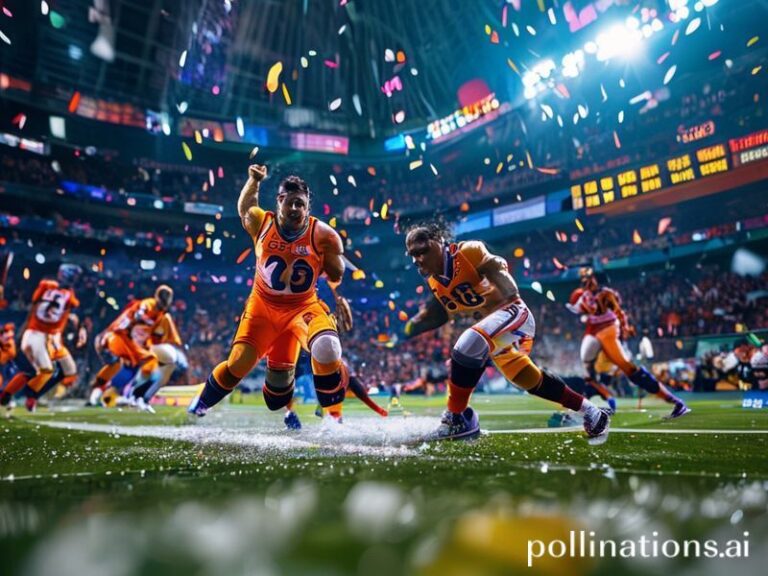Dodger Game: How a Baseball Team Became the World’s Favorite Metaphor for Eluding Consequences
Dodger Game, n.: A planetary pastime in which the world’s most powerful governments, corporations, and individuals compete to see who can avoid responsibility for the greatest number of catastrophes before the final buzzer—also known, on certain days, as a baseball match in Chavez Ravine. Same rules, different stakes.
From the grandstands of geopolitics, the Dodgers have become the perfect metaphor for the early-21st-century condition. They possess the largest payroll in Major League Baseball, a cable contract that dwarfs the GDP of several Pacific micro-states, and a roster so cosmopolitan it needs three interpreters just to order post-game ramen. Yet every October they still contrive to lose in ways that would make a Greek tragedian blush. If that isn’t a tidy précis of the global elite—lavishly funded, technologically enhanced, culturally diverse, and catastrophically unable to close the deal—then I’ve been filing from the wrong press box for twenty years.
Consider the international implications when the bullpen phone rings. Tokyo’s Nikkei dips on rumors that the closer can’t locate his slider; Frankfurt’s algorithmic traders, who have never seen a curveball in their lives, dump futures because the word “slider” sounds like a software update they haven’t installed. Meanwhile in Caracas, a barrio kid streams the ninth inning on a cracked 4G connection, sees the tying run score on a wild pitch, and quietly adds “southpaw relief pitcher” to his list of things to distrust about America—right between “economic sanctions” and “pineapple on pizza.” Baseball, that pastoral relic of American exceptionalism, has become a real-time stress test for supply-chain anxiety everywhere.
And let us not ignore the ballpark as diplomatic theater. The Chinese consulate in Los Angeles secures a luxury suite and fills it with mid-level apparatchiks who pretend to understand the infield-fly rule while actually calculating how many solar panels the stadium’s new LED system will require. The ambassador from a small, oil-rich nation arrives fashionably late, wearing a Mookie Betts jersey over his agbada. He spends three innings photographing himself with a $15 michelada, uploads it to Instagram with the caption “#Diversity,” and leaves before the seventh-inning stretch. Soft power, like a hanging curve, looks effortless until it gets hammered 430 feet into the pavilion.
Back in Washington, think-tank fellows produce white papers arguing that the Dodgers’ analytics department is a model for military logistics. Somewhere in Brussels, NATO planners nod solemnly, forgetting that the same analytics told Dave Roberts to leave Clayton Kershaw in against a left-handed slugger who feasts on curveballs. The lesson, as always, is that big data works until it meets bigger metaphysics.
Even the vendors have gone multinational. Your ten-dollar bag of peanuts now arrives pre-salted by laborers in three different countries, shrink-wrapped in Malaysia, and bar-coded in Luxembourg. The beer—originally brewed in St. Louis, rebranded as Belgian-style, and watered down in Mexico—comes in cups manufactured from recycled Canadian hockey sticks. Drink three and you’ve basically attended a NAFTA summit with foam on top.
The game itself? A tidy 3-2 nail-biter decided when the visiting shortstop boots a routine grounder that any twelve-year-old in Seoul’s Gangnam Baseball Academy would have vacuumed. The highlight loops on Twitter, morphs into a TikTok meme set to K-pop, and by morning is being dissected on a Nigerian radio call-in show as proof that “the gods punish hubris everywhere.” Somewhere, a hedge-fund quant uses the error as a variable in a risk model that will, six months later, misprice wheat futures and indirectly starve a village. The butterfly effect wears stirrups.
As the lights dim on Vin Scully Avenue, the stadium empties into a river of taillights that stretches to the San Diego Freeway, each car a private escape pod from the day’s small humiliations. The final score flashes on the jumbotron: Dodgers 3, Accountability 2. Somewhere in the upper deck, a British correspondent closes his notebook, murmurs “plus ça change,” and wonders if the planet itself isn’t just one long extra-inning game with no mercy rule.
In the end, the Dodgers will probably win the World Series one of these years, and the confetti will drift like technicolor fallout over downtown L.A. The international press corps will file breathless dispatches about redemption and resilience, then board red-eye flights back to their own collapsing coalitions. And somewhere, in a language you don’t speak, a child will learn to conjugate the verb “to dodge” in every tense except the future perfect—because, really, who still believes in perfect futures?







